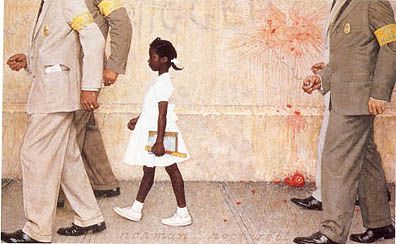


In many areas, black doctors were excluded from practice in medical facilities. This not only deprived them of opportunities, but deprived many patients of all colors of treatment they might otherwise have received. In 1963, the AMA and a black medical association agreed to form a joint committee to halt injustices toward African American doctors.
Source : Herblock's History

President John F. Kennedy called for southern governors to assure "a friendly and dignified reception" for foreign diplomats visiting the United States, amid widespread discrimination against blacks in restaurants and other public places. The governor of Virginia, where "massive resistance" to desegregation originated, promised to provide southern courtesy, but coupled his response with the suggestion that diplomats identify themselves as official representatives of their governments. Herb Block's cartoon, based on an actual occurrence, expressed the outrageousness of black Americans in the United States being held as less worthy of respectful treatment than foreigners.
"It's all right to seat them.
They're not Americans," April 27, 1961
Ink, graphite, and opaque white over graphite underdrawing on layered paper
Published in the Washington Post (48)
LC-USZ62-127069
"(…) I'm not going to sit at your table and watch you eat, with nothing on my plate, and call myself a diner. Sitting at the table doesn't make you a diner, unless you eat some of what's on that plate. Being here in America doesn't make you an American. Being born here in America doesn't make you an American. Why, if birth made you American, you wouldn't need any legislation; you wouldn't need any amendments to the Constitution; you wouldn't be faced with civil-rights in Washington, D.C., right now. They don't have to pass civil-rights legislation to make a Polack (someone from Poland: pejorative) an American.(…) No, I'm not an American. I'm one of the 22 million black people who are the victims of Americanism. One of the 22 million black people who are the victims of democracy, nothing but disguised hypocrisy. So, I'm not standing here speaking to you as an American, no, not I. I'm speaking as a victim of this American system. And I see America through the eyes of the victim. I don't see any American dream; I see an American nightmare."
Extracted from: “The Ballot or the Bullet” speech by Malcolm X April 3rd 1964
